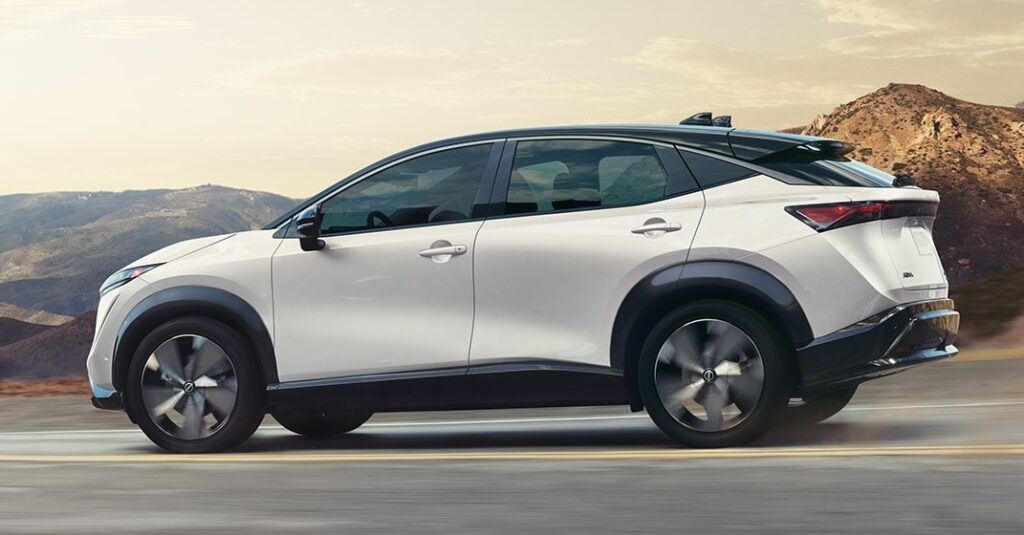
Sign up for daily news updates from CleanTechnica on email. Or follow us on Google News!
Rumors of an EV battery deal between Nissan and SK On have been flying faster than executive orders out of the White House. In the latest news, SK will reportedly pump out 300,000 EV batteries for Nissan’s electric cars in the US. That’s an interesting development considering the cloud of uncertainty billowing over the EV business. If true, it confirms that electric mobility has a firm foothold in the US, regardless of the cozy relationship between fossil energy stakeholders and the Commander-in-Chief.
More EV Batteries For Nissan In The US
The scoop on the battery rumor is attributed to Nikkei (aka Nihon Keizai Shimbun, with other press in Asia picking up on the story as well as Reuters. According to the reports, on January 23rd, SK On formally agreed to supply 20 gigawatt-hours worth of EV batteries to Nissan, enough to outfit 300,000 EVs, cementing negotiations that were under way last year.
The batteries and the vehicles will be manufactured in the US, in order to be eligible for federal tax credits under the Inflation Reduction Act of 2022.
Those manufacturing tax credits are baked into the IRA by law. It would be difficult if not impossible for the Trump administration to pull the rug out from under them, although with this gang, anything is possible. Still, Nissan and SK On seem pretty confident that they are on solid ground.
Reports of the agreement come on the heels of a good year for sales of Nissan EVs in the US, between the Leaf and the Ariya crossover. “A decade ago, this would have seemed wild — an electric Nissan crossover with more than 200 miles of range for less than $40,000, and access to Tesla Superchargers. That’s where we are, though,” CleanTechnica editor Zachary Shahan observed just a month ago (see our complete Nissan archive here).
More (Solid-State?) EV Batteries For Nissan In The US?
Word of the forthcoming SK On deal emerged just nine months after Nissan once again teased the idea of producing a solid-state battery, a thought it has been pitching since 2021.
“Nissan has been dropping hints about producing a new solid-state battery for several years now, and the company just dropped another clue earlier this week,” CleanTechnica reported last April.
As for what, exactly, will go into the batteries, Nissan has been playing it close to the vest. In a press statement issued back in November of 2021, the company stated that “Nissan aims to launch EV with its proprietary all-solid-state batteries (ASSB) by fiscal year 2028 and ready a pilot plant in Yokohama as early as fiscal year 2024.”
Consistent with the high performance, low cost formula characteristic of solid-state battery technology, Nissan anticipated that its new EV batteries would reduce charging time by two-thirds, reduce costs to $75.00 per kilowatt-hour by 2028, and reach an ultimate goal of $65.00/kWh after that.
In the meantime, SK On has also been hammering away at the all-solid-state battery (ASSB) of the future. The company publicized a recap of its research and manufacturing plans just a few days ago. “SK On is developing two types of ASSBs: polymer-oxide composite and sulfide-based, with commercial prototypes expected by 2027 and 2029, respectively,” SK On noted.
“The company’s solid-state battery pilot facility, currently under construction at its research center in Daejeon, Korea, is set for completion in the second half of 2025,” they added.
So, What’s With All These New Solid-State EV Batteries?
Solid-state batteries ditch the flammable liquid electrolyte of conventional lithium-ion EV batteries in favor of a solid or semi-sold architecture. That gives rise to a whole series of engineering challenges. A few years ago, industry observers anticipated that the technology would not be ready for prime time until 2030 or later, but SK is among the automotive stakeholders jumping the gun.
That’s still a bit off in the future. The timeline for the US manufacturing deal between Nissan and SK On appears too tight to take advantage of the solid-state EV batteries. According to media reports, the US deal calls for production beginning in 2028, when the commercial prototype phase for the new ASSB could still be in motion. Besides, Nissan has expressed a firm commitment to its own in-house ASSBs.
Also among the known unknowns is the forthcoming merger with Honda. When Nissan dropped some hints about its ASSB back in April, the company also reminded everyone that it is one-third of the “Alliance 2030” EV battery collaboration, with Renault and Mitsubishi Motors making up the other two-thirds. Alliance 2030 launched several years ago, with Nissan spearheading the work on solid-state EV batteries.
To complicate matters further, Honda is already hammering away at a new EV manufacturing hub in Ohio, with the firm LG Energy Solutions as battery supplier. And, last fall news dropped that a merger between Nissan and Honda is in the works.
No, What’s Really Going On?
And, let’s not forget Oxford University. Oxford has staked out a leading claim on solid-state battery research as part of the UK solid-state battery research initiative. Among the industry partners is Nissan, which leads to the question of what’s going on at Oxford?
Well, plenty. In April CleanTechnica noted that one area of focus is the prevention of dendrites, which are pesky fernlike growths that can develop in conventional lithium-ion batteries and solid-state batteries.
“If these can be overcome, solid-state batteries using lithium metal anodes could deliver a step-change improvement in EV battery range, safety and performance, and help advance electrically powered aviation,” Oxford noted back in 2023, when a research team at the school published a study identifying two elements in dendrite formation. Oxford also serves as a test bed for solid-state EV batteries, one recent example being the “Goliath” battery under development by the UK firm ilika.
In the latest development, last December a team of researchers from Oxford and Nissan published a new study in the journal Nature, which outlines a pathway for fabricating thin lithium films for solid-state batteries at the gigawatt scale.
“We identify thermal evaporation as a potentially cost-effective route to address these challenges and provide a techno-economic assessment of the projected costs associated with the fabrication of thin, dense lithium metal foils using this process,” the researchers explain.
Details are available under the title, “Techno-economic assessment of thin lithium metal anodes for solid-state batteries.” The team also took a stab at estimating manufacturing costs in China and other markets including the Canada-US-Mexico market, which may fragment if the current occupant of the White House keeps bellowing about tariffs.
That remains to be seen. In the meantime, Nissan is involved with Formula E electric motorsports, and the FIA-sanctioned organization has been talking about spicing things up with the introduction of solid-state EV batteries sometime in the near future.
The current series is already under way. Keep an eye out for some drama here in the US, where the global Formula E tour will hit Miami in April, right in the backyard of President Trump, who is following through on a plan to throttle EV sales in the US.
Photo (cropped): Nissan is following up on the success of its electric vehicle lineup in the US with plans to acquire 300,000 EV batteries to be manufactured by the firm SK On (Ariya crossover courtesy of Nissan).
Chip in a few dollars a month to help support independent cleantech coverage that helps to accelerate the cleantech revolution!
Have a tip for CleanTechnica? Want to advertise? Want to suggest a guest for our CleanTech Talk podcast? Contact us here.
Sign up for our daily newsletter for 15 new cleantech stories a day. Or sign up for our weekly one if daily is too frequent.
CleanTechnica uses affiliate links. See our policy here.
CleanTechnica’s Comment Policy

